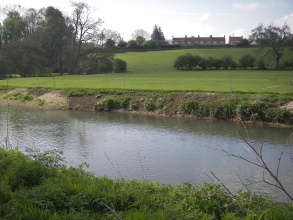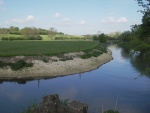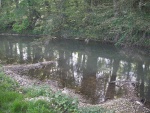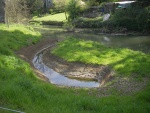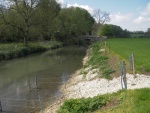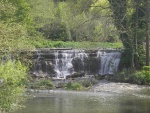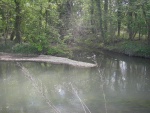Case study:Bleinheim Palace Project: Difference between revisions
Jump to navigation
Jump to search
No edit summary |
No edit summary |
||
| (7 intermediate revisions by 4 users not shown) | |||
| Line 1: | Line 1: | ||
{{ | {{Case study status | ||
|Approval status= | |Approval status=Approved | ||
}} | }} | ||
{{Location | {{Location | ||
| Line 18: | Line 13: | ||
|Country=England | |Country=England | ||
|Main contact forename=Nick | |Main contact forename=Nick | ||
|Main contact surname= | |Main contact surname=Haycock | ||
|Contact organisation=Haycock Environmental Consultants | |||
|Contact organisation= | |Partner organisations=Amenity Water, | ||
|Partner organisations=Amenity Water, | |||
|Multi-site=No | |Multi-site=No | ||
|Project picture=P1375.JPG | |Project picture=P1375.JPG | ||
|Picture description=River Evenlode, post restoration | |Picture description=River Evenlode, post restoration | ||
|Project summary=Due to their loss of spawning and nursery sites, rheophilic fish populations (especially barbel, chub and dace) the river Evenlode faced significant recruitment problems. These problems originate in the widening and dredging of the channel leaving it over-sized, with few features to provide habitat or refuge for juvenile fish. With local angling club membership dwindling, the project aimed to increase fish populations in the river through the introduction of a more diverse flow and the allowance of more frequent flooding. | |Project summary=Due to their loss of spawning and nursery sites, rheophilic fish populations (especially barbel, chub and dace) the river Evenlode faced significant recruitment problems. These problems originate in the widening and dredging of the channel leaving it over-sized, with few features to provide habitat or refuge for juvenile fish. With local angling club membership dwindling, the project aimed to increase fish populations in the river through the introduction of a more diverse flow and the allowance of more frequent flooding. | ||
}} | }} | ||
{{ | {{Image gallery}} | ||
| | {{Case study image | ||
|File name=P1378.JPG | |||
|Caption=River Evenlode, May 2006 | |||
}} | |||
{{Case study image | |||
|File name=P1386.JPG | |||
|Caption=Created side bars, May 2006 | |||
}} | |||
{{Case study image | |||
|File name=P1401.JPG | |||
|Caption=Backwater (for high water flows), May 2006 | |||
}} | |||
{{Case study image | |||
|File name=P1408.JPG | |||
|Caption=Water access for lifestock, May 2006 | |||
}} | |||
{{Case study image | |||
|File name=P1432.JPG | |||
}} | |||
{{Case study image | |||
|File name=P1437.JPG | |||
|Caption=Spit in river, May 2006 | |||
}} | |||
{{Image_gallery_end}} | |||
{{Toggle button}} | |||
{{Toggle content start}} | |||
{{Case study subcatchment | |||
|Subcatchment=Evenlode (Bledington to Glyme confluence) | |||
}} | }} | ||
{{Site | {{Site | ||
| Line 73: | Line 89: | ||
}} | }} | ||
{{Measures | {{Measures | ||
|Bank and bed modifications measure= | |Bank and bed modifications measure=Planting,Creation of pools and riffles, Introduction of spawning gravels, | ||
|Floodplain / River corridor=Creation of backwaters | |||
|Planform / Channel pattern=Channel narrowing, | |||
|Floodplain / River corridor= | |||
|Planform / Channel pattern= | |||
}} | }} | ||
{{Hydromorphological_quality_elements_header}} | {{Hydromorphological_quality_elements_header}} | ||
| Line 100: | Line 103: | ||
{{Monitoring_documents}} | {{Monitoring_documents}} | ||
{{Monitoring_documents_end}} | {{Monitoring_documents_end}} | ||
{{Additional_Documents}} | {{Additional_Documents}} | ||
{{Additional_Documents_end}} | {{Additional_Documents_end}} | ||
| Line 156: | Line 134: | ||
}} | }} | ||
{{Case_study_upload}} | {{Case_study_upload}} | ||
{{Toggle content end}} | |||
Latest revision as of 10:29, 5 June 2017
Location: 51° 52' 39.49" N, 1° 29' 42.45" W
Left click to look around in the map, and use the wheel of your mouse to zoom in and out.
Project overview
| Status | Complete |
|---|---|
| Project web site | |
| Themes | Habitat and biodiversity, Hydromorphology, Water quality |
| Country | England |
| Main contact forename | Nick |
| Main contact surname | Haycock |
| Main contact user ID | |
| Contact organisation | Haycock Environmental Consultants |
| Contact organisation web site | |
| Partner organisations | Amenity Water |
| Parent multi-site project | |
| This is a parent project encompassing the following projects |
No |
Project summary
Edit project overview to modify the project summary.
Due to their loss of spawning and nursery sites, rheophilic fish populations (especially barbel, chub and dace) the river Evenlode faced significant recruitment problems. These problems originate in the widening and dredging of the channel leaving it over-sized, with few features to provide habitat or refuge for juvenile fish. With local angling club membership dwindling, the project aimed to increase fish populations in the river through the introduction of a more diverse flow and the allowance of more frequent flooding.
Monitoring surveys and results
This case study hasn’t got any Monitoring survey and results, you can add some by editing the project overview.
Lessons learnt
This case study hasn’t got any lessons learnt, you can add some by editing the project overview.
Image gallery
|
Catchment and subcatchmentSelect a catchment/subcatchment
Catchment
Subcatchment
Site
Project background
Cost for project phases
Reasons for river restoration
Measures
MonitoringHydromorphological quality elements
Biological quality elements
Physico-chemical quality elements
Any other monitoring, e.g. social, economic
Monitoring documents
Additional documents and videos
Additional links and references
Supplementary InformationEdit Supplementary Information
| ||||||||||||||||||||||||||||||||||||||||||||||||||||||||||||||||||||||||||||||||||||||||||||||||||||||||||||||||||||||||||||||||||||||||||||||||||||||||||||||||||||||||||||||||||||||||||||||||

